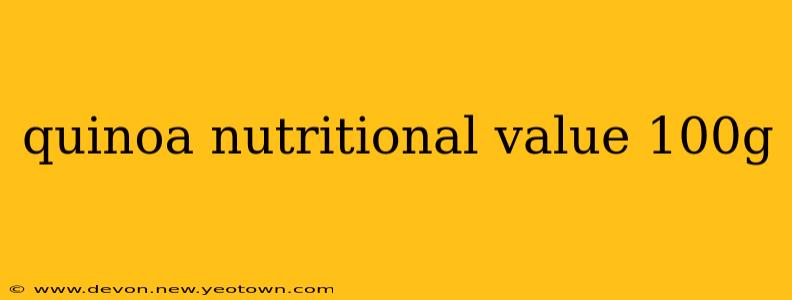Quinoa: A Nutritional Powerhouse Packed into 100 Grams
Quinoa, a complete protein boasting an impressive nutritional profile, has rightfully earned its place as a superfood. But what exactly makes 100 grams of this ancient grain so special? Let's delve into the nutritional powerhouse that is quinoa, exploring its benefits and answering some common questions.
Imagine a tiny seed, packed with more nutrients than you might expect. That’s quinoa for you! This complete protein, meaning it contains all nine essential amino acids our bodies can’t produce on their own, is a staple in many healthy diets. But beyond the protein, lies a wealth of vitamins, minerals, and fiber. A typical 100-gram serving offers a surprisingly diverse nutritional punch.
What are the key nutrients in 100g of Quinoa?
A 100-gram serving of cooked quinoa typically provides approximately:
- Protein: Around 4 grams. This is significant considering quinoa is a plant-based protein source.
- Carbohydrates: Roughly 21 grams, a good source of sustained energy. A portion of these carbs are complex carbohydrates, contributing to slow digestion and avoiding blood sugar spikes.
- Fiber: Approximately 3 grams, promoting healthy digestion and gut health.
- Fat: Around 2 grams, primarily unsaturated fats beneficial for heart health.
- Iron: A decent amount contributing to red blood cell production and oxygen transport throughout your body.
- Magnesium: Essential for hundreds of bodily functions, including muscle and nerve function, blood sugar control, and blood pressure regulation.
- Manganese: A vital mineral involved in bone health, wound healing, and metabolism.
- Phosphorus: Crucial for bone health and energy production.
- Zinc: Important for immune function and cell growth.
- Various B Vitamins: Contributing to energy production and overall well-being.
This is just a snapshot; the precise nutritional content can vary based on factors such as soil conditions and growing methods. However, it clearly illustrates why quinoa is considered a highly nutritious food.
Frequently Asked Questions about Quinoa's Nutritional Value
Our journey exploring the nutritional riches of quinoa continues with some commonly asked questions:
Is quinoa a good source of protein?
Yes, absolutely! Quinoa stands out amongst grains as a complete protein, meaning it contains all nine essential amino acids. While the protein content isn't as high as in some animal products, it provides a substantial contribution for vegetarians and vegans seeking diverse sources of protein. The 4 grams of protein in a 100g serving is a great start to a healthy intake.
How many calories are in 100g of quinoa?
A 100-gram serving of cooked quinoa contains approximately 120 calories. This relatively low calorie count, combined with its high nutrient density, makes it a smart choice for weight management and overall health.
What are the health benefits of eating quinoa?
The health benefits of quinoa extend beyond its impressive nutritional profile. Its high fiber content aids digestion and helps regulate blood sugar levels. The various vitamins and minerals contribute to overall health and well-being, while the protein supports muscle growth and repair. Regular quinoa consumption is linked to improvements in heart health, reduced inflammation, and better blood sugar control.
Is quinoa gluten-free?
Yes, quinoa is naturally gluten-free, making it a suitable option for individuals with celiac disease or gluten intolerance. However, always check product labels to ensure that the quinoa hasn't been processed in a facility that also handles gluten-containing grains, as cross-contamination can occur.
How can I incorporate quinoa into my diet?
The versatility of quinoa is a major draw. It can be used as a base for bowls, added to salads, incorporated into soups, or even used as a substitute for rice in various dishes. Experimenting with different flavors and spices opens up a world of culinary possibilities!
Quinoa’s remarkable nutritional value, along with its versatility and gluten-free nature, makes it a worthy addition to any healthy diet. So, next time you're planning your meals, remember the little seed that packs a powerful nutritional punch.

